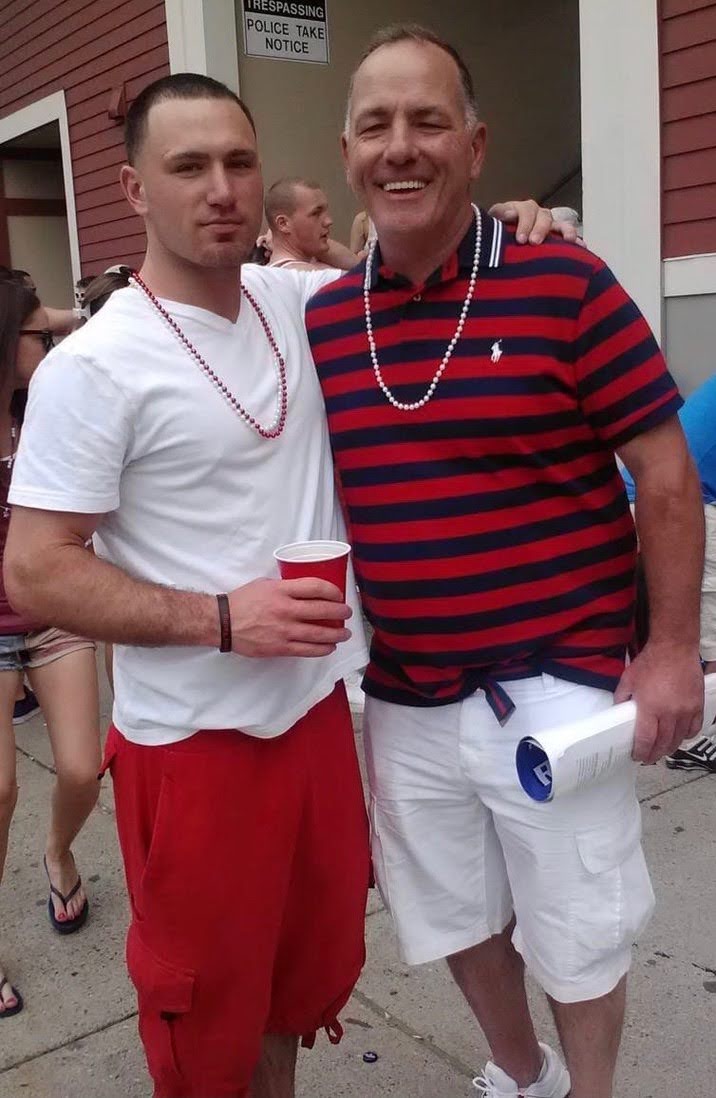
Peer Grief Helper Profile: Michael “Smokey” Cain
By Kerry J. Bickford, Voices Editor
Michael “Smokey” Cain lost his 24-year-old son, Michael, and two brothers in six short months between July 2015 and January 2016. Michael died from an overdose followed by one brother, who died from cancer, and the other by suicide. Smokey, who had been in recovery for four years at that point, could easily have been derailed by this sequence of events -- but he wasn’t. Instead, it opened his eyes to what is most important in this life and gave him a new and profound sense of purpose.
Smokey describes battling SUD for years, including time spent behind bars, finally committing to sobriety in 2011 -- when he stuck the landing. He quickly joined forces with the North Suffolk Mental Health Association as a navigator, helping implement safe practices for active recovery as part of a nationally recognized safety initiative. He walked the streets, meeting people where they were, many of whom were confronted with multiple issues related to their substance use, including loss of family, friends, shelter, resources, and self-esteem. Stigma is almost always the invisible elephant in the room, causing many people with advanced SUD to take to the woods and streets in their effort to avoid judgment. Smokey describes finding people frozen in makeshift shelters, burned from desperate attempts to stay warm, or dead from a fatal overdose with no one around to help or even care. It says a lot about how someone must have been feeling isolated to this degree rather than ask for help, and Smokey never forgets any of them. Witnessing their deaths connected him to every politician in his community and beyond, resulting in best-practices that he is proud to be part of, including three bills that have reached the state level centered around safe consumption sites. He sadly reports that his son, Michael, would be alive today if First Responders (at that time) had carried Narcan or if he had been able to obtain a bridge prescription after leaving a court-mandated program.
Smokey talks about this work with passion, including a 10-point initiative that includes recovery coaches and navigators like him who walk the streets in partnership with first responders and the local community at large. “They knocked it outta the park,” says Smokey about their bold step into harm reduction in a comprehensive outreach effort to save lives amid the nation’s greatest public health crises.
Despite all of this, Smokey helplessly witnessed his son’s journey through addiction. Michael was a star football player – destined for an Ivy League college team when, in his senior year, he broke his back in a game. The pain meds (Oxycontin) eventually led him to heroin, and despite a heroic effort to play football again, “he fell off the wagon,” says Smokey. Although he quickly filed a section 35 to save his son’s life, Michael overdosed and died only a week after being discharged from that program. Smokey shakes his head in disbelief still -- five years later -- when he thinks about Michael. “It’s hard to tell people how he died,” he says. It’s a disease that will bring you to your knees, and Smokey knows how important it is to give and receive support for these unspeakable losses.
Within months of Michael’s death, Smokey began co-facilitating a peer grief group at the Charlestown Coalition through GRASP with Shannon Lundin. The coalition provides trauma support and responds to tragedies, so it was a good fit. “My higher power was to continue this legacy of trying to make a difference,” Smokey says. But as much as he believed in the concept of peer support, including AA, which he has attended for years, he felt like their GRASP group needed something more. That’s when they joined up with The Sun Will Rise and SADOD to offer peer grief support within a community of people, just like him, who have lost someone they love to an overdose and who are committed to helping others. “It’s contagious,” he says about the spirit of doing something positive to make a difference in the names of our loved ones with the support of peers. “It’s like a family.”
These days, Smokey can be found working collaboratively at Mass General’s New Health comprehensive care team with other affiliated sites, providers, and coaches. In this role, he continues to provide advocacy and support to people who are living on the margins of society because of their disease. He insisted on singing the praises of Katie O’Leary, Shannon Lundin, and Sarah Coughlin of the Charlestown Coalition along with many others who have supported him and with whom he continues to partner as the work continues. Smokey, who is battling stage 4 cancer, also moonlights as a disc jockey, embracing every moment of his life that he can, knowing full well how precious it is.
Says Smokey in his signature upbeat way, “Experiencing death gives you a new perspective on what’s important. Mortality becomes real. I have a new sense of purpose. Grief support is all about connection and love.”
He’s right about that. In grief, we are connected to our late loved ones and once again reminded that love doesn’t die with them. Rather, it’s reflected back by the people, places and work we dedicate ourselves to in their memory and serves as the most important reminder of all.
